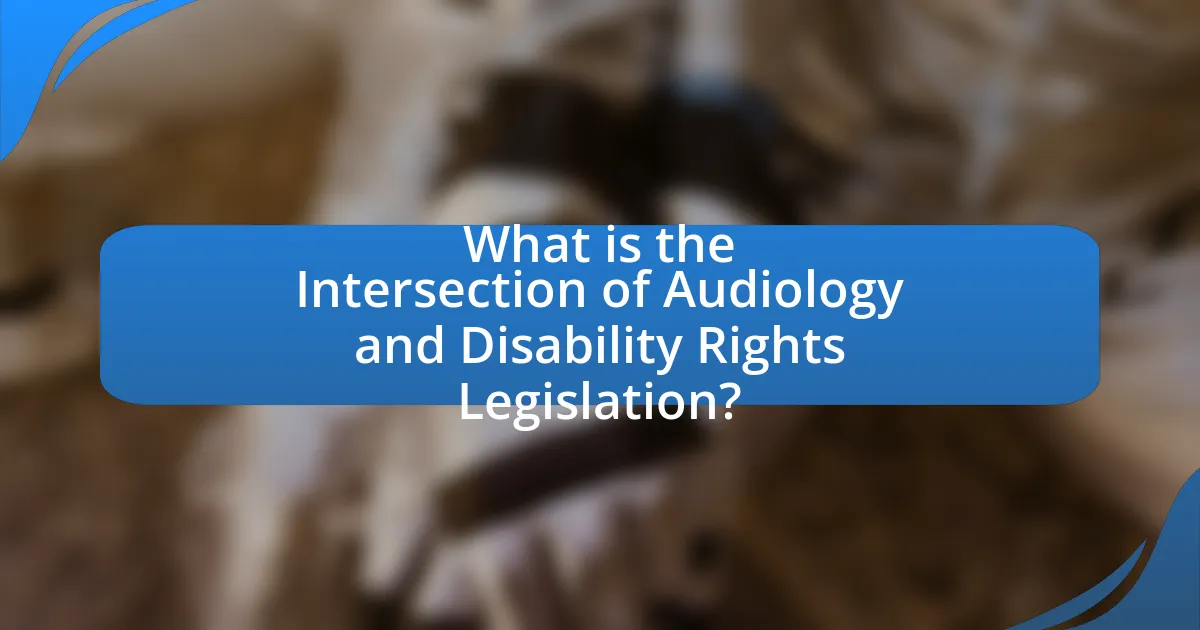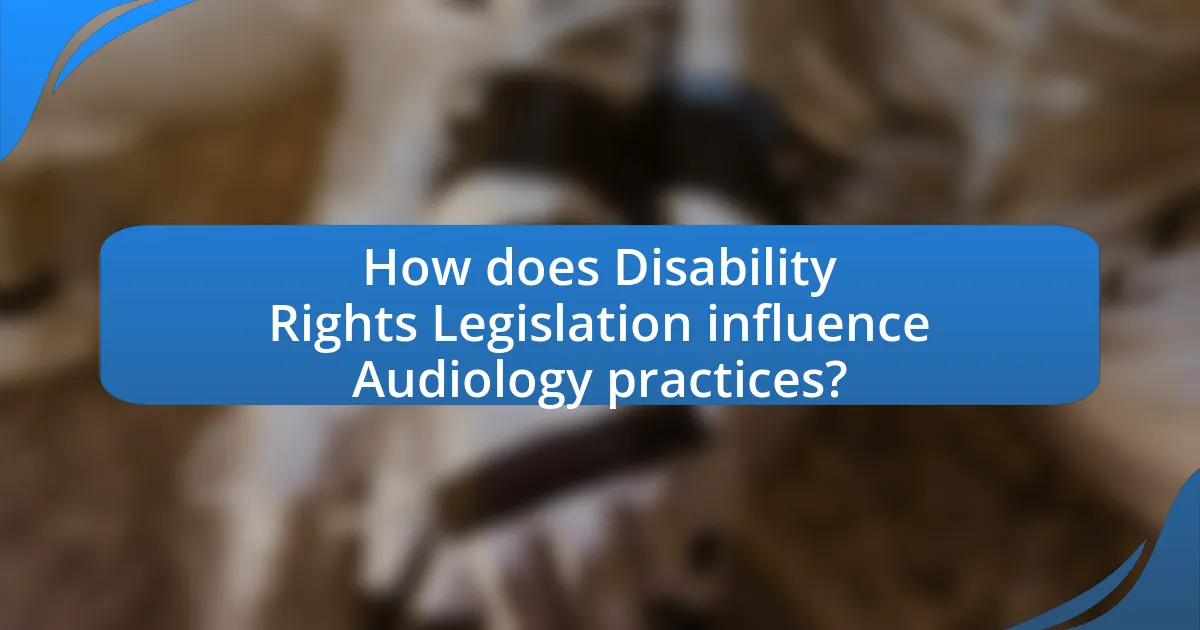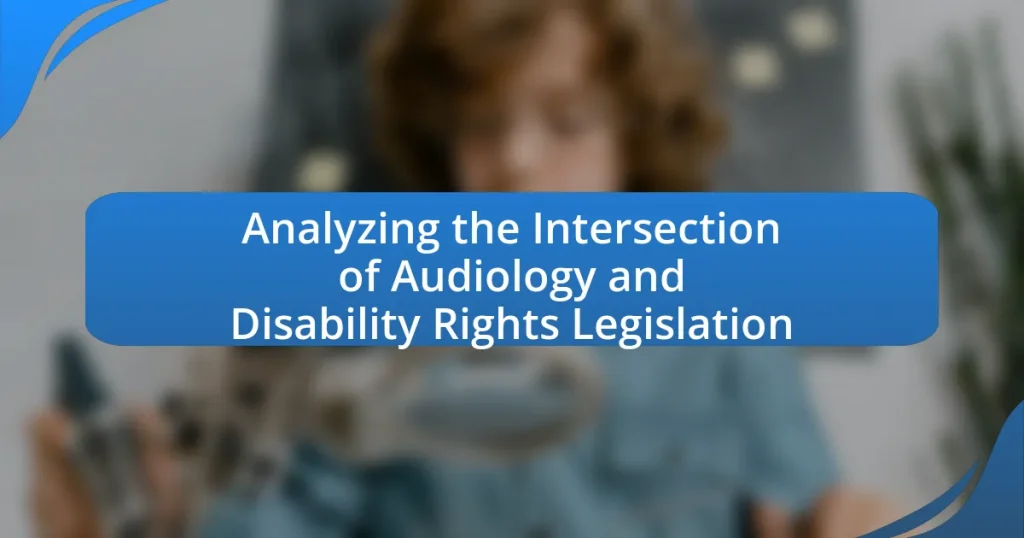The article analyzes the intersection of audiology and disability rights legislation, highlighting the legal frameworks that ensure individuals with hearing impairments receive necessary services and accommodations. It discusses the role of the Americans with Disabilities Act (ADA) in mandating equal access to audiological services, including hearing aids and assistive devices, thereby promoting the rights of those with hearing disabilities. Key principles of disability rights legislation, such as equality, accessibility, and inclusion, are examined, along with the impact of these laws on audiology practices and patient outcomes. The article also addresses the challenges audiologists face in complying with these regulations and offers best practices for creating inclusive environments for patients.

What is the Intersection of Audiology and Disability Rights Legislation?
The intersection of audiology and disability rights legislation lies in the legal framework that ensures individuals with hearing impairments receive appropriate services and accommodations. Legislation such as the Americans with Disabilities Act (ADA) mandates equal access to audiological services, including hearing aids and assistive listening devices, thereby promoting the rights of individuals with hearing disabilities. This legal protection is crucial for ensuring that audiologists provide necessary evaluations, treatments, and support to enhance communication and quality of life for those affected by hearing loss.
How do audiology practices relate to disability rights?
Audiology practices are integral to disability rights as they provide essential services that support individuals with hearing impairments, a recognized disability under various laws such as the Americans with Disabilities Act (ADA). These practices ensure access to hearing assessments, hearing aids, and rehabilitative services, which are crucial for enabling individuals with hearing loss to participate fully in society. The ADA mandates that individuals with disabilities receive equal opportunities and access to services, including those offered by audiologists, thereby reinforcing the importance of audiology in promoting disability rights and inclusion.
What are the key principles of disability rights legislation?
The key principles of disability rights legislation include equality, accessibility, and inclusion. Equality ensures that individuals with disabilities have the same rights and opportunities as those without disabilities, as established by the Americans with Disabilities Act (ADA) of 1990. Accessibility mandates that public spaces, services, and information be available to individuals with disabilities, which is supported by the Rehabilitation Act of 1973. Inclusion emphasizes the importance of integrating individuals with disabilities into all aspects of society, promoting their full participation in community life. These principles collectively aim to eliminate discrimination and promote the dignity and autonomy of individuals with disabilities.
How does audiology support individuals with disabilities?
Audiology supports individuals with disabilities by providing essential services that enhance communication abilities and overall quality of life. Audiologists assess, diagnose, and treat hearing and balance disorders, which are critical for individuals with disabilities who may experience auditory challenges. For instance, according to the World Health Organization, approximately 466 million people worldwide have disabling hearing loss, highlighting the need for audiological intervention. By fitting hearing aids, offering auditory rehabilitation, and implementing assistive listening devices, audiologists empower individuals with disabilities to engage more fully in social, educational, and professional environments. This support aligns with disability rights legislation, such as the Americans with Disabilities Act, which mandates equal access to communication for individuals with hearing impairments.
Why is understanding this intersection important?
Understanding the intersection of audiology and disability rights legislation is crucial because it directly impacts the accessibility and quality of hearing healthcare for individuals with hearing impairments. This intersection ensures that audiological services comply with legal standards that protect the rights of people with disabilities, promoting equitable access to necessary treatments and technologies. For instance, the Americans with Disabilities Act mandates that public services and accommodations be accessible, which includes audiological services. By understanding this intersection, stakeholders can advocate for policies that enhance service delivery, improve patient outcomes, and ensure compliance with legal requirements, ultimately fostering a more inclusive society for individuals with hearing disabilities.
What impact does this intersection have on accessibility?
The intersection of audiology and disability rights legislation significantly enhances accessibility for individuals with hearing impairments. This intersection ensures that legal frameworks, such as the Americans with Disabilities Act (ADA), mandate reasonable accommodations in various settings, including education, employment, and public services. For instance, the ADA requires that effective communication methods, such as sign language interpreters and assistive listening devices, be provided, thereby facilitating equal access to information and services for those with hearing disabilities. This legal backing not only promotes inclusivity but also empowers individuals by safeguarding their rights to participate fully in society.
How can awareness of this intersection improve patient outcomes?
Awareness of the intersection between audiology and disability rights legislation can significantly improve patient outcomes by ensuring that individuals with hearing impairments receive appropriate accommodations and services. This awareness leads to better advocacy for patients’ rights, enabling access to necessary audiological assessments, interventions, and assistive technologies. For instance, the Americans with Disabilities Act mandates equal access to services, which can enhance communication and social integration for individuals with hearing loss. Studies indicate that when patients are informed about their rights and available resources, they are more likely to seek timely treatment, resulting in improved health outcomes and quality of life.

What are the key components of Audiology in relation to Disability Rights?
The key components of Audiology in relation to Disability Rights include accessibility, advocacy, and individualized care. Accessibility ensures that individuals with hearing impairments have equal access to audiological services and technologies, as mandated by laws such as the Americans with Disabilities Act (ADA). Advocacy involves promoting the rights of individuals with hearing loss, ensuring they receive necessary support and resources. Individualized care focuses on tailoring audiological assessments and interventions to meet the unique needs of each patient, aligning with the principles of person-centered care in disability rights. These components collectively support the empowerment and inclusion of individuals with hearing disabilities in society.
How do audiologists advocate for disability rights?
Audiologists advocate for disability rights by promoting access to hearing healthcare and ensuring compliance with disability legislation. They work to educate policymakers about the needs of individuals with hearing impairments, emphasizing the importance of accessible communication and technology. For instance, audiologists often participate in advocacy groups that push for legislation like the Americans with Disabilities Act, which mandates equal access to services for people with disabilities. Additionally, they provide resources and support to patients navigating their rights, helping to empower individuals to seek necessary accommodations in educational and workplace settings.
What role do audiologists play in policy-making?
Audiologists play a crucial role in policy-making by providing expert knowledge on hearing health and its impact on individuals with hearing impairments. Their expertise informs legislation related to disability rights, ensuring that policies address the needs of those with hearing loss. For instance, audiologists contribute to the development of standards for hearing aids and assistive technologies, advocating for accessibility and affordability in healthcare. Their involvement is essential in shaping public health initiatives and educational programs that promote awareness of hearing health issues, ultimately influencing policies that enhance the quality of life for individuals with hearing disabilities.
How can audiologists ensure compliance with disability rights legislation?
Audiologists can ensure compliance with disability rights legislation by implementing accessible practices and adhering to legal standards that protect individuals with disabilities. This includes providing services that accommodate various disabilities, such as offering assistive listening devices and ensuring physical accessibility in their facilities. Additionally, audiologists must stay informed about relevant laws, such as the Americans with Disabilities Act (ADA), which mandates equal access to services for individuals with disabilities. Regular training on disability rights and inclusive practices further supports compliance, as it equips audiologists with the knowledge to address the specific needs of their patients effectively.
What challenges do audiologists face in this context?
Audiologists face several challenges in the context of disability rights legislation, primarily related to compliance and accessibility. Ensuring that hearing services meet the legal standards set by laws such as the Americans with Disabilities Act (ADA) can be complex, as audiologists must navigate varying state regulations and guidelines. Additionally, they encounter difficulties in advocating for equitable access to hearing aids and services for individuals with disabilities, as insurance coverage often does not fully support these needs. Research indicates that only 14% of adults with hearing loss use hearing aids, highlighting the gap in accessibility and affordability that audiologists must address.
What barriers exist in providing services to individuals with disabilities?
Barriers in providing services to individuals with disabilities include physical accessibility issues, lack of trained personnel, inadequate funding, and insufficient awareness of disability rights. Physical accessibility issues, such as the absence of ramps or elevators, hinder individuals from accessing necessary services. The lack of trained personnel limits the quality of care and support available, as many professionals may not be equipped to address specific needs. Inadequate funding restricts the resources available for service provision, leading to long wait times and reduced service availability. Additionally, insufficient awareness of disability rights among service providers can result in discriminatory practices and a failure to comply with legal obligations, further complicating access to essential services.
How can audiologists overcome these challenges?
Audiologists can overcome challenges by implementing comprehensive training programs that focus on disability rights legislation and its implications for audiology practice. These programs can enhance audiologists’ understanding of legal requirements, ensuring compliance and improving patient care. For instance, the Americans with Disabilities Act mandates equal access to services, which audiologists must integrate into their practices to avoid legal repercussions and provide equitable care. Additionally, audiologists can collaborate with disability advocacy groups to stay informed about evolving legislation and best practices, thereby fostering a more inclusive environment for patients with hearing impairments.

How does Disability Rights Legislation influence Audiology practices?
Disability Rights Legislation significantly influences Audiology practices by mandating accessibility and non-discrimination in hearing healthcare services. This legislation, such as the Americans with Disabilities Act (ADA), requires audiologists to provide equal access to diagnostic and treatment services for individuals with hearing impairments. Compliance with these laws ensures that audiology practices must implement accommodations, such as providing assistive listening devices and ensuring physical accessibility in clinics. Furthermore, the legislation promotes awareness and training among audiologists regarding the specific needs of patients with disabilities, thereby enhancing the quality of care and fostering an inclusive environment.
What specific laws impact audiology services?
The specific laws that impact audiology services include the Individuals with Disabilities Education Act (IDEA), the Americans with Disabilities Act (ADA), and the Rehabilitation Act of 1973. IDEA mandates that children with disabilities receive appropriate educational services, which often includes audiological assessments and interventions. The ADA prohibits discrimination against individuals with disabilities in various areas, including healthcare services, ensuring that audiology services are accessible. The Rehabilitation Act of 1973, particularly Section 504, requires that individuals with disabilities have equal access to programs and services, which encompasses audiology services. These laws collectively ensure that individuals with hearing impairments receive necessary support and accommodations in educational and healthcare settings.
How do these laws shape service delivery in audiology?
Disability rights laws significantly shape service delivery in audiology by mandating equal access to audiological services for individuals with hearing impairments. These laws, such as the Americans with Disabilities Act (ADA) and the Individuals with Disabilities Education Act (IDEA), require audiologists to provide accommodations, ensuring that services are accessible and tailored to meet the needs of all patients. For instance, the ADA prohibits discrimination and requires facilities to be accessible, which directly influences how audiology practices are structured and operated. Compliance with these laws not only enhances service delivery but also promotes inclusivity and equity in healthcare for individuals with hearing disabilities.
What are the implications of non-compliance with these laws?
Non-compliance with audiology and disability rights legislation can lead to significant legal and financial repercussions for organizations and individuals. Specifically, entities may face lawsuits, fines, and loss of funding, as seen in cases where institutions failed to provide necessary accommodations, resulting in legal actions under the Americans with Disabilities Act (ADA). Additionally, non-compliance can damage reputations and hinder access to services for individuals with disabilities, as evidenced by the U.S. Department of Justice’s enforcement actions against non-compliant entities, which highlight the importance of adhering to these laws to ensure equitable access to audiological services.
What are the best practices for audiologists regarding disability rights?
Audiologists should adhere to best practices that prioritize the rights and needs of individuals with disabilities by ensuring accessibility, providing informed consent, and advocating for equitable treatment. Accessibility involves creating an inclusive environment where services are available to all individuals, including those with hearing impairments, in compliance with the Americans with Disabilities Act (ADA). Informed consent requires audiologists to clearly communicate the implications of assessments and treatments, ensuring patients understand their options and rights. Advocacy for equitable treatment includes actively supporting policies that promote disability rights and participating in community outreach to raise awareness about the needs of individuals with disabilities. These practices align with ethical standards set by professional organizations, such as the American Speech-Language-Hearing Association (ASHA), which emphasizes the importance of respecting the dignity and autonomy of all clients.
How can audiologists create inclusive environments for patients?
Audiologists can create inclusive environments for patients by implementing accessible communication strategies and ensuring physical accessibility in their practices. Accessible communication includes using clear language, providing written materials in multiple formats, and utilizing assistive technologies such as hearing loops or captioning services. Physical accessibility involves ensuring that facilities comply with the Americans with Disabilities Act (ADA) standards, which mandate accessible entrances, restrooms, and waiting areas. Research indicates that inclusive practices not only enhance patient satisfaction but also improve health outcomes, as patients are more likely to engage in their care when they feel understood and accommodated.
What resources are available for audiologists to stay informed about disability rights?
Audiologists can access several resources to stay informed about disability rights, including the American Speech-Language-Hearing Association (ASHA), which provides guidelines and updates on legislation affecting individuals with disabilities. Additionally, the National Association of the Deaf (NAD) offers resources and advocacy information relevant to audiologists. The Disability Rights Education and Defense Fund (DREDF) also provides comprehensive information on disability rights laws and policies. These organizations regularly publish articles, host webinars, and provide newsletters that keep audiologists updated on current issues and changes in disability rights legislation.
What practical steps can audiologists take to advocate for their patients’ rights?
Audiologists can advocate for their patients’ rights by actively engaging in policy development and promoting awareness of disability rights legislation. They can participate in local and national advocacy groups, such as the American Speech-Language-Hearing Association, to influence policies that affect hearing healthcare access. Additionally, audiologists should educate patients about their rights under laws like the Americans with Disabilities Act, ensuring patients understand their entitlements to services and accommodations. By providing resources and support for patients navigating these systems, audiologists can empower individuals to assert their rights effectively.


